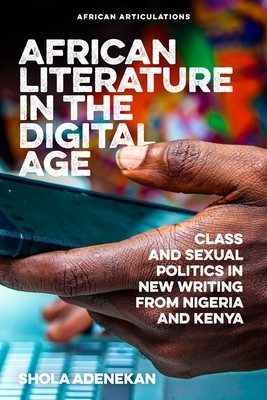
- We will send in 10–14 business days.
- Author: Shola Adenekan
- Publisher: James Currey
- ISBN-10: 1847012388
- ISBN-13: 9781847012388
- Format: 15.5 x 23.6 x 2 cm, kieti viršeliai
- Language: English
- SAVE -10% with code: EXTRA
Reviews
Description
The first book-length study on the relationship between African literature and new media.
The digital space provides a new avenue to move literature beyond the restrictions of book publishing on the continent. Arguing that writers are putting their work on cyberspace because communities are emerging from this space, and because increasing numbers of Africans use the internet as part of their day-to-day engagement with their societies and the world, Shola Adenekan explores this transformative development in Nigeria and Kenya, both significant countries in African literature and two of the continent's largest digital technology hubs.
Queer Kenyans and Nigerians find new avenues for their work online where print publishers are refusing to publish short stories and poems on same-sex desire. Binyavanga Wainaina's rise to critical acclaim arguably started on the literary blog Generator 21. Chimamanda Ngozi Adichie's literary celebrity partly relies on her prolific use of social media to tell thestory of powerful Nigerian women. With further examples from the development of literature across the continent, this innovative book sheds new light on narratives about digital Africa. It will also be the first major work to provide a trajectory of class consciousness in Kenyan and Nigerian writing. Through this analysis, the book articulates the difference in attitudes towards queerness, sexuality, and hetero-normativity among successive generations of writers.
EXTRA 10 % discount with code: EXTRA
The promotion ends in 21d.22:12:34
The discount code is valid when purchasing from 10 €. Discounts do not stack.
- Author: Shola Adenekan
- Publisher: James Currey
- ISBN-10: 1847012388
- ISBN-13: 9781847012388
- Format: 15.5 x 23.6 x 2 cm, kieti viršeliai
- Language: English English
The first book-length study on the relationship between African literature and new media.
The digital space provides a new avenue to move literature beyond the restrictions of book publishing on the continent. Arguing that writers are putting their work on cyberspace because communities are emerging from this space, and because increasing numbers of Africans use the internet as part of their day-to-day engagement with their societies and the world, Shola Adenekan explores this transformative development in Nigeria and Kenya, both significant countries in African literature and two of the continent's largest digital technology hubs.
Queer Kenyans and Nigerians find new avenues for their work online where print publishers are refusing to publish short stories and poems on same-sex desire. Binyavanga Wainaina's rise to critical acclaim arguably started on the literary blog Generator 21. Chimamanda Ngozi Adichie's literary celebrity partly relies on her prolific use of social media to tell thestory of powerful Nigerian women. With further examples from the development of literature across the continent, this innovative book sheds new light on narratives about digital Africa. It will also be the first major work to provide a trajectory of class consciousness in Kenyan and Nigerian writing. Through this analysis, the book articulates the difference in attitudes towards queerness, sexuality, and hetero-normativity among successive generations of writers.


Reviews